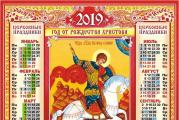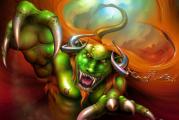Cities that will be hit by a nuclear attack. Nuclear facts and plans for a strike on the Russian Federation. Nuclear attack on Novosibirsk
Publication date 10/16/2014
In ancient times, when there was no television, radio, telephone, cinema, when there were no books yet, and people could neither read nor write,
when the Vyatka people were completely illiterate, the only source of spiritual and moral communication between people was oral folk art.
What a charm these fairy tales are
Many epics, legends, tales, fairy tales and jokes, proverbs and sayings, songs and ditties were born among the people, passed from person to person, from mouth to mouth, from generation to generation. On long winter evenings in the dim light of a torch, people told each other different stories and tales, sang songs and ditties, Children eagerly listened to grandmother's tales and fell asleep to a soft lullaby.
Alexander Sergeevich Pushkin, recalling the tales of his nanny Arina Radionovna he heard in childhood, wrote: “What a charm these tales are, each is a poem.” And V. G. Belinsky said: “In fairy tales, the life of the people is visible, their domestic life, his moral concepts and this crafty Russian mind, so inclined towards irony, so simple-hearted in its cunning. There is no pessimism or doom in them. Faith in one's own strength, in goodness, optimism is the main pathos of these fairy tales.
In fairy tales, colorful figures of Vyatka people appear before us, who “do not climb into their pockets for a word” and who always “go smart ahead, followed by a tongue.”
Tales of the Vyatka people
Here is one of the old tales of the Vyatka people about the Foolovites.
Somewhere far away in the dense Vyatka forest was a village. People lived in this village from birth to death, they didn’t see a verst of a clean place, they didn’t go anywhere from their village, they didn’t go, they didn’t communicate with anyone in the district, they didn’t know anything and that’s why they were stupid.

Young and old, women and men - they were all stupid, and their village was also called Foolovka. Among the Foolovites there was one muzhik smarter, more perceptive. They called him Guess for that, so he is stupid. Once the Foolov peasants went into the forest to hunt. They walked and walked, suddenly they see: there is a hole under the tree, and steam comes out of the hole. The men were surprised, began to think - what could it be? We thought, we argued, we didn't agree on anything. One says: "Let's go to the village, ask Dogada, maybe he knows."

They came to the village, found Dogada (he is sitting, weaving bast shoes), they ask: “We went to the forest, we see; there is a hole under the tree, and steam comes out of the hole, so what could it be?”
Guess thought, thought, scratched the back of his head and said: “But you have to go and see for yourself.” They went back to the forest, found that place, they saw: there was a hole under the tree, and steam was pouring out of the hole. What could it be? Guess says: “You hold me by the legs, and put your head into the hole, I’ll take a look, and when I kick my leg, drag me back.” And so they did: they hold them by the legs, they put their head into the hole. And it was a den! The bear bit off Dogal's head, and he only kicked up with his feet. One says; “It seems to have already jumped,” the other says: “But it seems not, it hasn’t jumped yet.” They began to argue, jumped - did not jump, drag - do not drag. They didn’t argue with anything, one says: “Let’s pull it out, we’ll ask ourselves if it’s time to drag it.” They pulled it out, they look - but there is no head. Again began to argue whether there was a head or not? One says: “Let's go to the village, ask Dogadikha if there was a head, she probably knows. They came to the village.

Dogadikha bakes bread in the oven, they ask: “Did Dogadikha have a head when he went into the forest?” Dogadikha wrinkled her forehead, thought and said: and I don't remember."
The Vyatka people have their own fictional heroes, they are not found in fairy tales of other areas. For example, Nikita the red tape is a kind of blooper who at the end becomes the king and marries the queen, or Soldier Vyatkin, who went to woo the English queen herself. In fairy tales, it is not complete without evil spirits, these are such characters - the Giant Kudeyar, Leshy, Baba Yaga, Brownie, Kikimora. Kikimora is especially loved by the Vyatichi people. In the city of Kirov there is Kikimorskaya mountain. Before the revolution of 1917, there was Kikimorskaya street in the city. It is no coincidence that the Vyatka region is declared the birthplace of Kikimora.
And then the librarian introduced the fairy-tale guests of the lesson to the preschool children - the toy Brownie and Kikimora. These entertaining guests told the children about the types of fairy tales, about modern collectors of fairy tales, who retold old Vyatka fairy tales in a modern way so that “everyone could understand”.
Kikimorka "read" to the preschoolers a curious Vyatka fairy tale "Mount Kikimorskaya" from the collection of I. K. Yaropolov. Domovenok did not lag behind, his tales - "The Fox-Boastful" from the collection "Once upon a time there were storytellers ..." and "The Priest and the Worker" from the collection "Magic Ring" - were also remembered by the kids for their interesting plot.
The lesson ended with a call to read Vyatka tales and fairy tales, because they contain folk wisdom our ancestors.
Ekaterina Malykh




